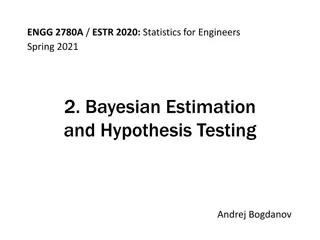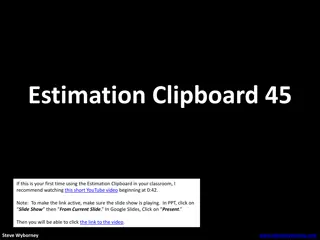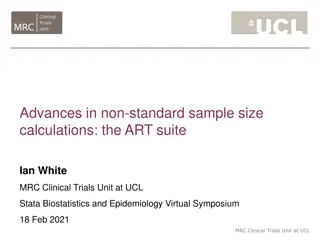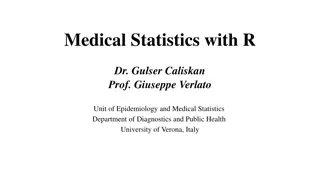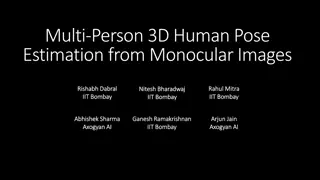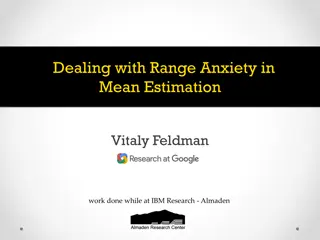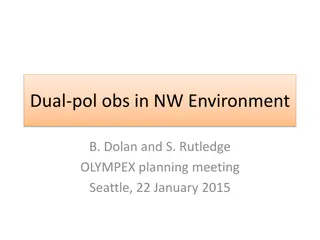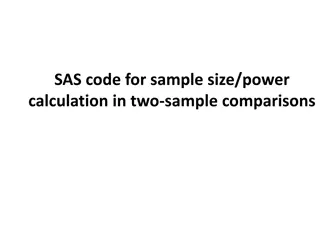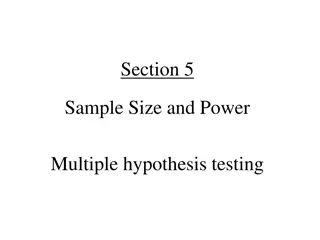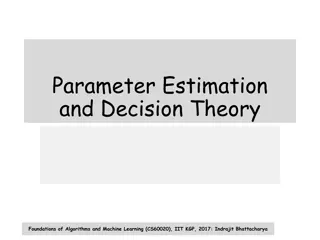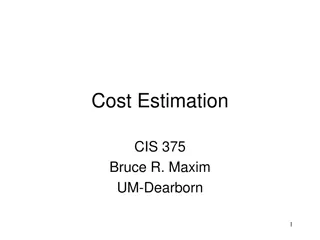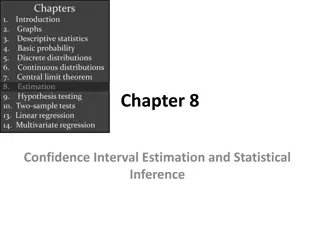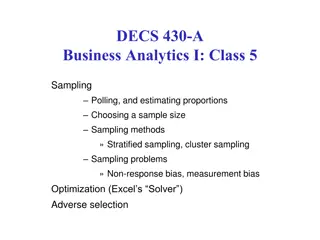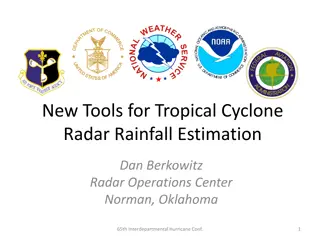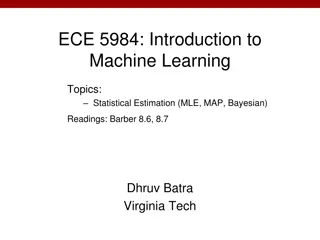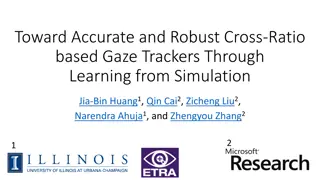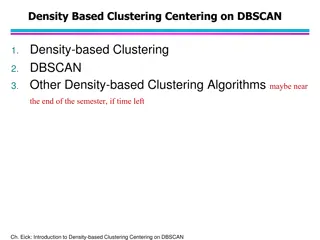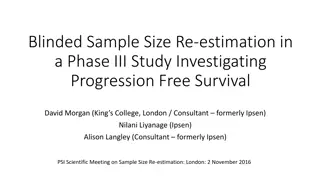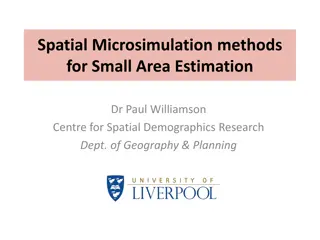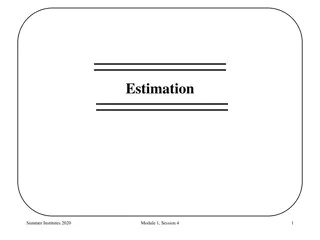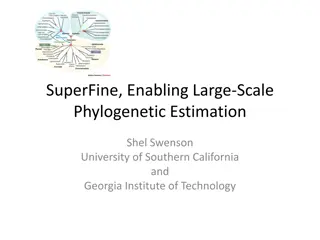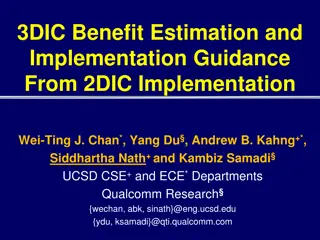Introduction to Econometric Theory for Games in Economic Analysis
This material delves into the fundamentals of econometric theory for games, focusing on estimation in static and dynamic games of incomplete information, as well as discrete static games of complete information, auction games, and algorithmic game theory. It covers basic tools, terminology, and main
10 views • 31 slides
Bayesian Estimation and Hypothesis Testing in Statistics for Engineers
In this course on Bayesian Estimation and Hypothesis Testing for Engineers, various concepts such as point estimation, conditional expectation, Maximum a posteriori estimator, hypothesis testing, and error analysis are covered. Topics include turning conditional PDF/PMF estimates into one number, es
1 views • 16 slides
Determining Sample Size for Research Studies: Factors and Considerations
Sample size estimation in research is a crucial step that involves various factors such as effect size, population standard deviation, power of the experiment, and significance level. The effect size indicates the practical significance of research findings, with common measures like Cohen's d and P
2 views • 24 slides
Comminution and Particle Size Reduction in Pharmaceutical Processes
Comminution is the process of reducing particle size from larger to smaller particles, crucial in various industries like pharmaceuticals. This operation involves milling, grinding, and size reduction to make raw materials usable. The particle size plays a significant role in pharmaceutical formulat
3 views • 50 slides
Estimation Clipboard 68 and New Esti-Mysteries Resources
Dive into Estimation Clipboard 68 and explore new Esti-Mysteries and Number Sense resources for everyday use in the classroom. Discover engaging activities and tools designed by Steve Wyborney to enhance mathematical learning experiences. Watch the instructional video, solve the bear estimation chal
2 views • 4 slides
Project Cost Estimation: Methods and Factors
Project cost estimation involves valuing all monetary aspects necessary for planning, implementing, and monitoring a project. This includes various entrants such as preliminary investigation costs, design fees, construction expenses, and more. The purpose of cost estimation is to determine work volu
1 views • 44 slides
Using the Estimation Clipboard in the Classroom
Explore tips for effectively using the Estimation Clipboard in the classroom to engage students in mathematical reasoning and estimation activities. The process involves inviting students to share estimates, encouraging written estimates and discussions, and revealing answers to promote engagement a
1 views • 5 slides
Advances in Sample Size Calculations for Clinical Trials: The ART Suite
This presentation discusses the importance of sample size calculations in research studies, especially in the context of clinical trials. It covers tools like ART and Power in Stata for binary and categorical outcomes, emphasizing the need to determine the right sample size to ensure research questi
4 views • 35 slides
Sample Size and Effect Size in Medical Statistics
Explore the crucial aspects of power analysis, sample size determination, effect size estimation, and their interrelations in medical statistics. Learn how these components influence experimental design and decision-making in research studies. Discover the significance of adequately balancing sample
3 views • 46 slides
3D Human Pose Estimation Using HG-RCNN and Weak-Perspective Projection
This project focuses on multi-person 3D human pose estimation from monocular images using advanced techniques like HG-RCNN for 2D heatmaps estimation and a shallow 3D pose module for lifting keypoints to 3D space. The approach leverages weak-perspective projection assumptions for global pose approxi
0 views • 8 slides
Dealing with Range Anxiety in Mean Estimation
Dealing with range anxiety in mean estimation involves exploring methods to improve accuracy when estimating the mean value of a random variable based on sampled data. Various techniques such as quantile truncation, quantile estimation, and reducing dynamic range are discussed. The goal is to reduce
3 views • 12 slides
Estimation Puzzle: How Many Blue Rocks in the Vase?
A fun estimation challenge where clues are provided to narrow down the possibilities of the number of blue rocks in a vase. By using critical thinking and estimation skills, participants deduce that there are 65 blue rocks in the vase. Test your estimation abilities with engaging visual clues and de
2 views • 6 slides
Dual-Pol Observations in NW Environment OLYMPEX Planning Meeting
The OLYMPEX planning meeting in Seattle on January 22, 2015 discussed the contribution of polarimetric S-band radar in rain estimation systems targeted by OLYMPEX. The use of specific differential phase (Kdp) helps in minimizing assumptions about drop size distribution, convective/stratiform distinc
1 views • 15 slides
Fermi Problems and Estimation Techniques in Science
Understand Enrico Fermi's approach to problem-solving through estimation in science as demonstrated by Fermi Problems. These problems involve making educated guesses to reach approximate answers, fostering creativity, critical thinking, and estimation skills. Explore the application of Fermi Problem
1 views • 23 slides
SAS Code for Sample Size and Power Calculation in Two-Sample Comparisons
SAS code snippets are provided for conducting power and sample size analyses in two-sample comparisons using the TWOSAMPLEMEANS statement. The code covers scenarios such as two-sample t-tests assuming equal variances, unbalanced designs, unequal variances, and more. Examples and syntax are included
2 views • 10 slides
Sample Size, Power, and Hypothesis Testing in Statistics
Sample size determination based on estimation precision and confidence interval width is crucial in statistical analysis. By calculating the necessary sample size, researchers can ensure sufficient standard errors and confidence intervals. Additionally, the relationship between power and sample size
2 views • 50 slides
Foundations of Parameter Estimation and Decision Theory in Machine Learning
Explore the foundations of parameter estimation and decision theory in machine learning through topics such as frequentist estimation, properties of estimators, Bayesian parameter estimation, and maximum likelihood estimator. Understand concepts like consistency, bias-variance trade-off, and the Bay
0 views • 15 slides
Software Development Cost Estimation Best Practices
Explore key principles and techniques for accurate cost estimation in software development projects. Discover the importance of the 5WHH principle, management spectrum, critical practices, resource estimation, estimation options, and decomposition techniques for improved project planning. Learn abou
1 views • 40 slides
Estimation and Statistical Inference in Data Analysis
Statistical inference involves acquiring information and drawing conclusions about populations from samples using estimation and hypothesis testing. Estimation determines population parameter values based on sample statistics, utilizing point and interval estimators. Interval estimates, known as con
0 views • 41 slides
Sampling Methods in Business Analytics
Sampling plays a crucial role in estimating proportions and making informed decisions in business analytics. From polling to estimating proportions, this class explores sampling techniques, sample size determination, and potential biases. Learn about choosing a sample size, stratified and cluster sa
3 views • 23 slides
Advances in Tropical Cyclone Radar Rainfall Estimation
Reviewing past methods and introducing new tools for radar rainfall estimation in tropical cyclones. Discusses advancements in Dual Polarization rainfall estimation and NSSL's National Mosaic & Multi-Sensor Quantitative Precipitation Estimation. Includes insights on reflectivity-to-rainfall relation
0 views • 28 slides
Introduction to Statistical Estimation in Machine Learning
Explore the fundamental concepts of statistical estimation in machine learning, including Maximum Likelihood Estimation (MLE), Maximum A Posteriori (MAP), and Bayesian estimation. Learn about key topics such as probabilities, interpreting probabilities from different perspectives, marginal distribut
1 views • 23 slides
Two-Stage Local Linear Least Squares Estimation
This presentation by Prof. Dr. Jos LT Blank delves into the application of two-stage local linear least squares estimation in Dutch secondary education. It discusses the pros and cons of stochastic frontier analysis (SFA) and data envelopment analysis (DEA), recent developments in local estimation t
0 views • 24 slides
Parameters, Statistics, and Statistical Estimation in Statistics
In statistics, we differentiate between parameters and statistics, where parameters describe populations and statistics describe samples. Statistical estimation involves drawing conclusions about populations based on sample data. The Law of Large Numbers explains the relationship between sample stat
2 views • 12 slides
Advanced Gaze Estimation Techniques: A Comprehensive Overview
Explore advanced gaze estimation techniques such as Cross-Ratio based trackers, Geometric Models of the Eye, Model-based Gaze Estimation, and more. Learn about their pros and cons, from accurate 3D gaze direction to head pose invariance. Discover the significance of Glint, Pupil, Iris, Sclera, and C
0 views • 40 slides
The Black-Scholes Formula and Volatility Estimation
The Black-Scholes formula, developed by Dr. Fernando Diz, is a widely used model for pricing options. This formula calculates the theoretical price of an option based on various inputs, with volatility being a key factor. Volatility estimation can be done through historical or implied methods, each
0 views • 18 slides
Sample Size Parameters in Pet Product Studies
This set of additional slides delves into the main parameters used in simulations for determining sample sizes in pet product studies. It covers the methods of simulations, statistical support, new simulations, resulting sample sizes, variations between animals and days, and the rationale behind spe
0 views • 11 slides
Density-based Clustering: DBSCAN and Density Estimation
Density-based clustering algorithms like DBSCAN utilize density-estimation techniques to identify clusters based on data density. Density estimation involves constructing estimates of underlying probability density functions using various approaches such as non-parametric methods like Kernel density
0 views • 25 slides
STARSHADE DATA CHALLENGE Approach & Release: Proposed Methods for Background Estimation
The proposed approach for the STARSHADE DATA CHALLENGE involves three high-level steps focusing on background estimation and removal, transformation of multi-spectral foreground image pixels, and Bayesian inference for planet detection. Findings from background estimation development may lead to rev
0 views • 17 slides
Blinded Sample Size Re-estimation in Phase III Study Investigating Progression-Free Survival
Investigate the use of blinded sample size re-estimation in a Phase III study on progression-free survival. Focus on trial design, sample size calculation, practicalities, SSRE design, implementation, regulatory issues, and trial outcome. Explore the CLARINET study on Lanreotide in treating neuroend
0 views • 27 slides
Sample Size Mean Estimation Tool
Use the Sample Size Calculator to determine the sample size needed to estimate a population mean with a specified confidence level and precision. Input historical standard deviation, desired margin of error, and significance level to obtain the sample size. Follow the steps provided in the tutorial
0 views • 4 slides
Density Estimation in R: Parametric vs. Non-Parametric Methods
This content delves into the concepts of density estimation in R, comparing parametric methods where a specific form of the density function is assumed known, with non-parametric methods that require no assumption on the distribution's form. Explore topics like maximum likelihood estimation, Bayesia
0 views • 36 slides
Confidence Intervals and Sample Size in Statistics
In this material, you will explore confidence intervals for means, sample size determination, proportions, variances, and standard deviations. Discover the significance of point estimation, z-values, and population mean estimation. Delve into practical applications and insights into statistical meth
0 views • 42 slides
Basic Info for Training DSC Q2000 - Sample Preparation & Thermal Methods
Extracted from the ppt "Basic Info for Training DSC Q2000" this content provides guidance on the importance of sample preparation techniques for Differential Scanning Calorimetry (DSC) experiments. It covers aspects such as selecting the right pan, shaping the sample, determining sample size, and th
1 views • 15 slides
Nonpoint Oil and Gas Emission Estimation Tool 2017 Overview
Explore the Nonpoint Oil and Gas Emission Estimation Tool for the 2017 NEI by Mike Pring, providing valuable insights into emission estimation methods for the oil and gas industry. Access the 2017 tool files, reports, and updates, along with details on emission changes from 2014 to 2017 across diffe
0 views • 8 slides
Spatial Microsimulation Methods for Small Area Estimation with Dr. Paul Williamson
Explore spatial microsimulation methods for small area estimation in geographical research, focusing on direct survey estimation, conventional SAE approaches, and unconventional SAE approaches like spatial microsimulation. Learn about techniques, challenges, and potential solutions in small area est
1 views • 29 slides
Introduction to Estimation Methods in Probability and Statistics
Learn about estimation methods such as Maximum Likelihood and Bayes in the context of probability and statistical models. Understand the process of making inferences about unknown parameters using data samples. Explore techniques like AIC, BIC, and Bayesian Estimation. Enhance your understanding of
1 views • 13 slides
Enhancing Phylogenetic Estimation Through SuperFine Technology
Explore the cutting-edge technology of SuperFine that enables large-scale phylogenetic estimation, emphasizing the importance of phylogeny, DNA sequence evolution, and the application of multiple genes in tree estimation. Understand the significance of the Tree of Life in biology and the evolution o
0 views • 31 slides
Estimation and Implementation Guidance for 3DIC Benefits
Explore the benefits and challenges of 3DIC implementation, including the estimation of power reduction benefits and the need for accurate power estimation tools. Learn about the upper bounds on wirelength reduction and the tight integration of 3D power benefit estimation tools to enhance implementa
1 views • 24 slides
Utilizing Simulation for Cluster Study Design in Oral Health Intervention
Explore the use of simulation with IPDpower in designing a randomised cluster study of an oral health intervention in care homes. The study aims to improve oral health among older persons in care homes by providing training to staff. Measures include the Geriatric Oral Health Assessment Index, and t
0 views • 23 slides

